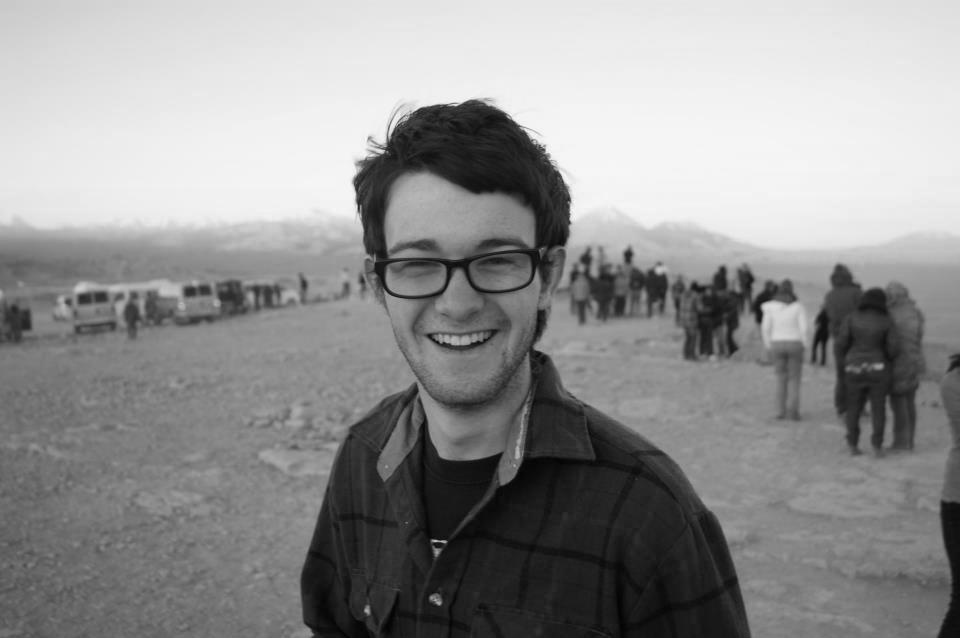
News
Summers Will Not Finish Semester of Teaching as Harvard Investigates Epstein Ties

News
Harvard College Students Report Favoring Divestment from Israel in HUA Survey

News
‘He Should Resign’: Harvard Undergrads Take Hard Line Against Summers Over Epstein Scandal

News
Harvard To Launch New Investigation Into Epstein’s Ties to Summers, Other University Affiliates

News
Harvard Students To Vote on Divestment From Israel in Inaugural HUA Election Survey
Artist Spotlight: Andy J. Boyd '14

"I’m not a nihilist. I’m an extravagant idealist,” says Andy J. Boyd ’14. Boyd’s idealism is reflected in the gadfly-like character of his writing, which often includes acerbic social and political criticism. In addition to writing and directing several pieces for the Harvard stage, most recently the drama, “Acres of Diamonds,” Boyd composes songs and radio pieces, is active on Twitter and PolicyMic as a commentator on popular culture, and performs improv comedy with the Harvard Instant Gratification Players. His cited influences include German playwright Bertolt Brecht, Brazilian theater director Augusto Boal and the Russian playwright Anton Chekhov.
The Harvard Crimson: You’re very interested in popular culture: you write songs and perform improv comedy. On the other hand you spend time writing plays, some of which are based on classical models like “Antigone.” How are these different interests related for you and what are you trying to do with them?
Andy J. Boyd: I think that artists ought to be engaged with critical response and with popular culture. They shouldn’t view their art as existing apart from their social environment but they should try to grapple with it in a critical way…. I don’t write from life directly. I don’t think anyone does…. I think that an appreciation of culture is necessary to create it. It’s very important to me to feel like I’m engaging with the culture that I’m writing in [and] to not separate my political, historical, artistic, [and] cultural interests.
THC: Do you feel, then, that artists should have moral responsibilities?
AJB: Yes, I do! In our country, we have incredible material comforts. And yet, we’re so sad! There’s this pervading sense of pointlessness to the whole enterprise [and] to the entirety of the neoliberal regime. At a basic level, questions of value and questions of art and culture have no place in our culture because they don’t add to the gross domestic product. So I feel that art, and religion, and poetry and philosophy all have a responsibility to ask those questions that are antithetical to our neoliberal society.
THC: Your more recent work, plays like “Stingers” and “Acres of Diamonds,” figure angry, young, college-age individuals frustrated with their age, but they often don’t have any better solutions themselves. Does that reflect a view, on your part, that young people are not able to change the world for the better?
AJB: I’m really most interested in doing [the] first part of a work, where the audience and the characters will come in with a more or less stable sense of themselves. And I’m trying to upset that, to rupture it and destroy it and force them to put it back together, hopefully in a better way. But I’m not interested in telling them how to do that. This is what is what I think is the essential difference between the arts and philosophy. Philosophy takes the appearance of chaos, and provides order. Art takes the appearance of order and provides chaos. I don’t think the message of a work of art can be translated into philosophy. So, yes, I do feel that youth can change the world. And yes, I do understand that some of my plays can feel nihilistic, but that’s the error in reading these plays as philosophical. They’re supposed to be provocative, but they’re not supposed to claim that there is no solution. They’re just supposed to claim that what we have now is not the solution.
THC: You went to art school before this. Can you say more about that?
AJB: I went to the Arizona School for the Arts for two years, graduated in 2010. I studied acting, directing, theater, and theory. And my work is very influenced by this. The biggest thing that I got from art school was: a character is not just the role that they play societally, socially, ideologically, but they are also not just not that. So I’m very interested in seeing how characters are at a certain level stereotypical, and then seeing how those stereotypes change, or break down. The plays start with characters being very clear allegories for ideologies or social positions, and then…they break down. And I think this is maybe the most realistic thing about my plays. We start out with an idea of how we ought to be, and what makes this interesting is the ways in which we fail.
THC: How long have you been writing, or conceiving of yourself as a writer? What led you to decide to write plays?
AJB: 17 was when I started getting serious about writing plays and seeing that as the thing I wanted to do. When I was in art school, we would just do these terrible plays… I kept getting these roles and acting in them and thinking, ‘I can do better than this.’
—Staff writer Victoria Zhuang can be reached at vzhuang@college.harvard.edu.
Want to keep up with breaking news? Subscribe to our email newsletter.
